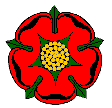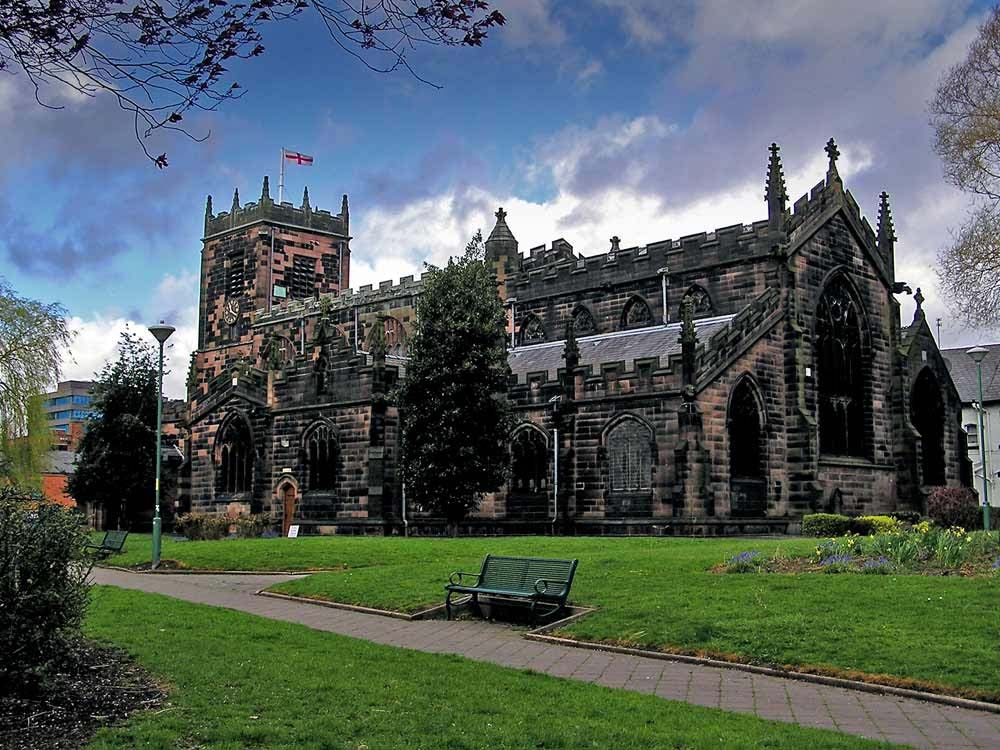 |
The Parish of St Mary the Virgin, Eccles |
 |
St Mary the Virgin, Eccles
 | |
Photograph courtesy of Edward Smith |
A parish in the hundred of SALFORD, county palatine of LANCASTER, 4 miles (W.) from Manchester, comprising the chapelries of Pendleton and Worsley, and the townships of Barton, Clifton, and Pendlebury, and containing 23,331 inhabitants.
The living is a discharged vicarage, in the archdeaconry and diocese of Chester, rated in the King’s books at £6.8., and in the patronage of the Crown. The church, dedicated to St. Mary de Eccles, is in the later style of English architecture, and belonging to Whalley abbey, but at the dissolution it was made parochial.
Independents, Wesleyan Methodists, and Roman Catholics, have each a place of worship, with a school attached.
There are manufactories for silk, nankeen, gingham, and linen cloth; also a large cotton-mill, which affords employment to about four hundred people. A school-room in the church-yard was rebuilt by subscription in 1816, and is partly supported by a bequest from James Bradshaw, in 1800, of £8.8. per annum, and partly from the parish fund of benefactions; five hundred and thirty children are taught at this school. The Manchester and Liverpool rail-road passes close to the village. The abbot and convent of Whalley established a small settlement of monks at this place; a small portion of the building remains, and forms part of a farm-house, bearing the name of Monks’ Hall. Robert Ainsworth, author of the Latin and English Dictionary, was born here in 1660.(1)
(1) From: A Topographical Dictionary of England, By Samuel Lewis, London, 1831. Vol. 2, page 109.
Eccles is a market town. Its correct name is Barton upon Irwell in the parish of Eccles. Argument about this is futile. Everybody now calls the place Eccles and there’s an end of the matter. Its market is of little importance these days of motor omnibuses which pick you up at Eccles Market Place and drop you in the middle of Manchester… The market these days consists of a few stalls which sell vegetables.
The parish is ancient. Its church is of fourteenth-century foundation. The building was restored in 1862. Its registers are complete from 1542. In the last quarter of the nineteenth century part of a fifth-century Celtic cross was unearthed nearby and is now preserved in the parish church. A modern plain stone cross stands in the market place replacing a similar one that ages had worn away. When we were very young we lads, if delayed by this, that or the other, such as being kept late at work, used to arrange to meet “at t’ cross” if our Saturday night adventurings took us to Eccles by way of a change from our week-end’s trip to Manchester’s Shudehill Market.
Opposite the Church is a shop, and the name over the door is Bradburn. I do not know whether there is still a Mr. Bradburn but my thanks are due to the inventor of those delicious Eccles cakes which, in happier times, when currants, the main constituent of those delectable confections, were plentiful, tempted my gluttony. Ah me! Patience, patience, until once again the currant ships sail past Barton Bridge to the murky headwaters of the Manchester Ship Canal.
Students of the theatre may prick up their ears at the name of Baron Booth. There was a John del Bothe at Barton, or Eccles as we now call it, in the thirteenth century. Barton Booth, the player, came of this family and was born in Lancashire in 1681. His father intended him for the Church and, at seventeen, sent him to Trinity College, Cambridge. But the siren, the theatre, lured him from the quiet haunts of learning to the fretful rivalry for public acclaim that can, and all too often does, make young men old in their struggles to snatch the glittering, slippery prizes dangled by the stage.
To his family’s anger he cleared off from Cambridge and joined a company of strolling players. He became a great and popular actor and was patronized by the nobility at Court. So friendly was he with the nobs that they placed their coaches and horses at his disposal and, after the show at night, he would leave Drury Lane Theatre and be at Windsor in three hours, returning to town next day by similar conveyance.
He died in 1733 at the age of 52 and his widow, his second wife, had the memorial erected to him which you may see in the Poet’s Corner of Westminster Abbey.
A descendant of his, also an actor, gained notoriety in the theatre by other means. This man, John Wilkes Booth, on Good Friday 1865 walked into a box at Ford’s Theatre in Washington and, taking out a pistol, assassinated the President of the United States of America, Abraham Lincoln.(2)
(2) From: Lancashire, by Walter Greenwood, London, 1951, pages 125-126.
Entered here August 21, 2004 by Lynn Ransom Burton, who saw the memorial to Barton Booth in Westminster Abbey in 1952.
| Salford Home & Contents | ©Lancashire OnLine Parish Clerks | Lancashire Home |